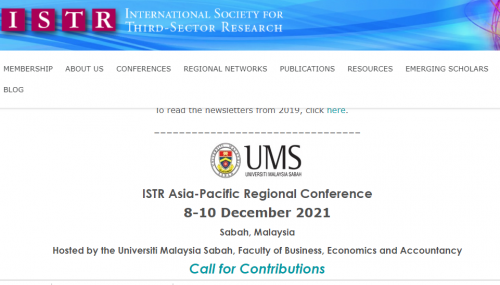https://www.istr.org/page/AsiaPacific
IMPORTANT DATES
Deadline for Abstract submissions: August 1, 2021
Notification of acceptance/rejection to authors: September 15, 2021
Deadline for presenter conference registration: October 15, 2021
Deadline for final submission of papers: November 26, 2021
Special programming for PhD Students: December 7, 2021
Conference: December 8-10, 2021
Conference Registration Fees
ISTR Members: $200 USD/$150 USD students
Non-members: $325 USD for those from middle/high income countries/$250 for those from low income countries. This fee includes includes a one-year ISTR Membership.
Limited registration subsidies will be available.
Conference Local Hosts
Organizing Chairperson: Dr. Janice L. H. Nga, Associate Professor, Planning and Development Economics, Faculty of Business, Economics and Accountancy, Universiti Malaysia Sabah
Deputy Chairperson: Dr. Rozilee Bin Asid, Deputy Dean (Research & Innovation), Universiti Malaysia Sabah
Active Civil Society: Post-crises rebuilding, mobilising and innovating
2020 has been marked by dramatic dislocations and disruptions including the Covid-19 pandemic and political changes across the region and globally. These crises have had variable effects on third sector organisations and civil society in particular, with reports of constrained resources, outmoded communication/collaboration technologies and passive responses. Yet, civil society survives and thrives as it actively develops community crises responses, forms networks of mutual aid, mobilises action and innovates to achieve new outcomes.
The Covid-19 pandemic has infiltrated all walks of life and the effects on civil society and the third sector have varied between nations and across different segments of society. These include the mobilisation of volunteers, but also the recognition that volunteering has changed, as have the ways of recruiting, managing and supporting them. Funding has been disrupted in all sectors, with philanthropy stretched to deal with urgent issues, government funding demanded by all but limited, low donations, often due to the disruption of fundraising events. More positively, extensive use of communication technologies have allowed for innovations, although it has also highlighted the digital divide. Post-crisis life therefore presents opportunities to rebuild, and innovate and we invite papers that reflect on these changes and the ‘new normal’ that can guide third sector organisations in the future.
Crises, such as the Covid-19 pandemic, are felt unequally across generations, socio-economic structures and in different regions. Civil society is instrumental in mitigating the worst effects of these impacts, to advocate for democratic solutions, mobilise and connect communities and highlight and work against discriminations. Again, post-crisis reflection enables learning about how best to rebuild, mobilise and innovate.
Research is important in learning, publicising and developing innovations, yet the crisis has disrupted the lives of researchers who are family members, teachers, and civil society members as well. Access to empirical data has been restricted in some instances and required innovations and perseverance. Papers that present innovations in method, theory and practice are welcomed, as noted below.
ISTR ASIA PACIFIC CONFERENCE STREAMS
Researchers are invited to submit papers under the following streams:
1. Civil Society’s Active Response/s to Crises
2. Civil Society and Democratisation
3. Developing Southern Theory for Third Sector Studies
4. Digitization/technology, Open Government and Civil Society
5. Emerging Methodologies, Theory and Practice
6. Organization and Leadership
7. Philanthropy
8. Partnerships and Collaborations, including Corporate Social Responsibility
9. Regulation and Change
10. Social Enterprise
11. Sustainable Development Goals: Working Towards Their Achievement
12. Third Sector Innovation in Welfare, Education and Health
13. Sustainability and Environmental Issues in Civil Society
GENERAL INFORMATION
Forms of Participation: Papers, Panels, Roundtable, and Posters
Abstract Submissions
To be considered for review, an abstract of not more than 500 words (not including references) must include:
• A statement of the empirical or theoretical concern.
• A short summary locating the concern within a wider literature.
• A concise account of the empirical or theoretical methodological approach.
• The main arguments of the paper and an indication of the supporting evidence.
• A statement of the main conclusions and their relevance to an international audience
_________________________________
MEETING: Wednesday, 7 October 2020
Asia Pacific Regional Network Meeting
6:00 pm Hong Kong. Check your time zone.
This meeting is open to the public. To register, click here.
Conference Registration Fees
ISTR Members: $200 USD/$150 USD students
Non-members: $325 USD for those from middle/high income countries/$250 for those from low income countries. This fee includes includes a one-year ISTR Membership.
Limited registration subsidies will be available.
Conference Local Hosts
Organizing Chairperson: Dr. Janice L. H. Nga, Associate Professor, Planning and Development Economics, Faculty of Business, Economics and Accountancy, Universiti Malaysia Sabah
Deputy Chairperson: Dr. Rozilee Bin Asid, Deputy Dean (Research & Innovation), Universiti Malaysia Sabah
_________________________________
MEETING: Wednesday, 7 October 2020
Asia Pacific Regional Network Meeting
6:00 pm Hong Kong. Check your time zone.
This meeting is open to the public. To register, click here.











Add new comment